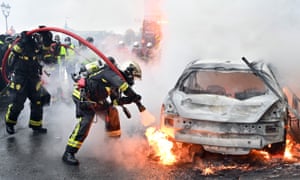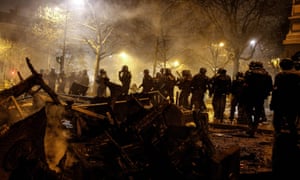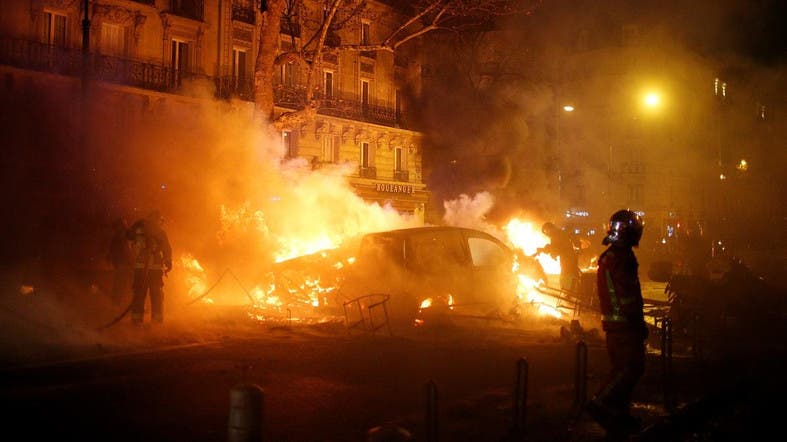By Angelique ChrisafisAt least 100 people injured in street battles, with cars being torched and shops raided.
The French president, Emmanuel Macron, has insisted he will “never accept violence” after central Paris saw its worst unrest in a decade on Saturday when thousands of masked protesters fought running battles with police, torched cars, set fires to banks and houses, and burned makeshift barricades on the edges of demonstrations against fuel tax.
Near the Arc de Triomphe, one of Paris’s best-known monuments, masked men burned barricades, set fire to buildings, smashed fences and torched luxury cars on some of the most expensive streets in the city as riot police fired teargas and water cannon.
Then, by early evening, rioters spread around Paris in a game of cat and mouse with police. Luxury department stores on Boulevard Haussmann were evacuated as cars were set alight and windows smashed. Near the Louvre, metal grilles were ripped down at the Tuileries Garden where fires were started. On the Place Vendôme, a hub of luxury jewellery shops and designer stores, rioters smashed windows and built barricades.
Anti-Macron graffiti was scrawled over the Arc de Triomphe near the tomb of the unknown soldier and protesters burst into the monument smashing up its lower floors before climbing on to the roof.
More than 250 people were arrested and at least 100 injured – including one protester who was in a serious condition on Saturday night – after the violence erupted on the margins of anti-fuel tax demonstrations held by the citizens’ protest movement known as the gilets jaunes (yellow vests).
Macron, who was attending the G20 summit in Buenos Aires, said he would lead an emergency meeting of senior government ministers after returning to Paris on Sunday morning. He said: “No cause justifies that security forces are attacked, shops pillaged, public or private buildings set on fire, pedestrians or journalists threatened or that the Arc de Triomphe is sullied.”
He said that the peaceful demonstrators – whose name derives from their fluorescent high-visibility jackets and who have been demonstrating against taxes for two weeks – had legitimate concerns and he would hear their anger. But he said their demonstrations across the country on Saturday had been infiltrated by violent rioters who would be brought to trial in court.
In Paris, the protest began early in on Saturday morning as peaceful gilets jaunes arrived at the Champs Élysées to stage a march. The spontaneous citizens’ movement began in mid-November in opposition to rising fuel taxes but it has shifted into a much broader anti-government and anti-Macron protest movement about inequality and poor living standards. Slogans on Saturday slammed the centrist, pro-business president as a symbol of an elite cut off from the people.
The gilets jaunes have significant support from the general public and are proving the biggest headache yet for Macron, who was taken by surprise by the anti-tax revolt and is struggling to quell it.
Saturday’s violence and shocking scenes of burning buildings, torched cars and flames rising on the smartest streets of central Paris present an even bigger challenge to the government, which fears being seen as unable to keep a lid on the unpredictable protests and the violence on its edges.
Authorities on Saturday stressed the difference between peaceful protesters who marched along some Paris streets on Saturday morning, singing and waving flags, and the violent clashes that followed.
About 5,000 gilets jaunes marched down the Champs Élysées at midday, some carrying roses, many shouting: “Macron, resign!” and singing the national anthem. The Champs Élysées was closed to cars and tightly monitored by police, with identity and bag checks taking place as shop workers boarded windows and dismantled outdoor terraces. But by early on Saturday afternoon the Arc de Triomphe was surrounded by masked protesters fighting running battles with police.The interior minister, Christophe Castaner, said thousands of troublemakers unconnected to the peaceful demonstrations had deliberately come to “pillage, smash, steal, wound and even kill”. He called them rioters who were “professionals at causing disorder”. Authorities suggested extreme-right and extreme-left militants were involved in the rioting. The interior minister said that by 8pm police had cleared most rioters from central Paris. Across France, more than 75,000 gilets jaunes demonstrated in cities or blocked roads and toll booths, some briefly stormed the runway of Nantes airport and others blocked supermarkets and major motorway junctions or staged barricades near government buildings. There were 580 roadblocks across the country. In the past two weeks, hundreds of thousands of protesters have taken similar action, complaining that Macron’s pro-business fuel tax policy was unfair and that people in low-income jobs could not make ends meet. “The yellow vests will triumph,” was daubed across the facade of the 19th-century Arc de Triomphe monument in large black letters – and greeted with condemnation from politicians. Many gilets jaunes protesters spoke out against the violent skirmishes on the edge of the demonstrations.
“What message do the yellow vests want to pass today? That we set France on fire, or find solutions? I find this [violence] absurd,” Jacline Mouraud, a prominent activist within the movement, told BFM television.
However, another protester said: “The government is not listening. Revolution cannot happen without violence.”
Jean-Luc Mélenchon, the head of the leftwing France Insoumise party, described the protests as “a process of citizens’ revolution”.
Macron said last week that he understood the anger people felt over the rise in fuel tax. He promised three months of national talks on how to transform France into a low-carbon economy without penalising people on low incomes who had to drive to work.
But government attempts to negotiate with the movement have not calmed the protests.
“We want our dignity back and we want to be able to live from our work, which is absolutely not the case today,” Jason Herbert, a spokesman for the movement, said after walking out of talks with the prime minister, Édouard Philippe, on Friday.
Hundreds of people have been injured and two people have been killed in car accidents since the protests began on 17 November. Polls continue to show that the demonstrations are supported by most French people. The protests have also spawned copycat demonstrations in Belgium.











